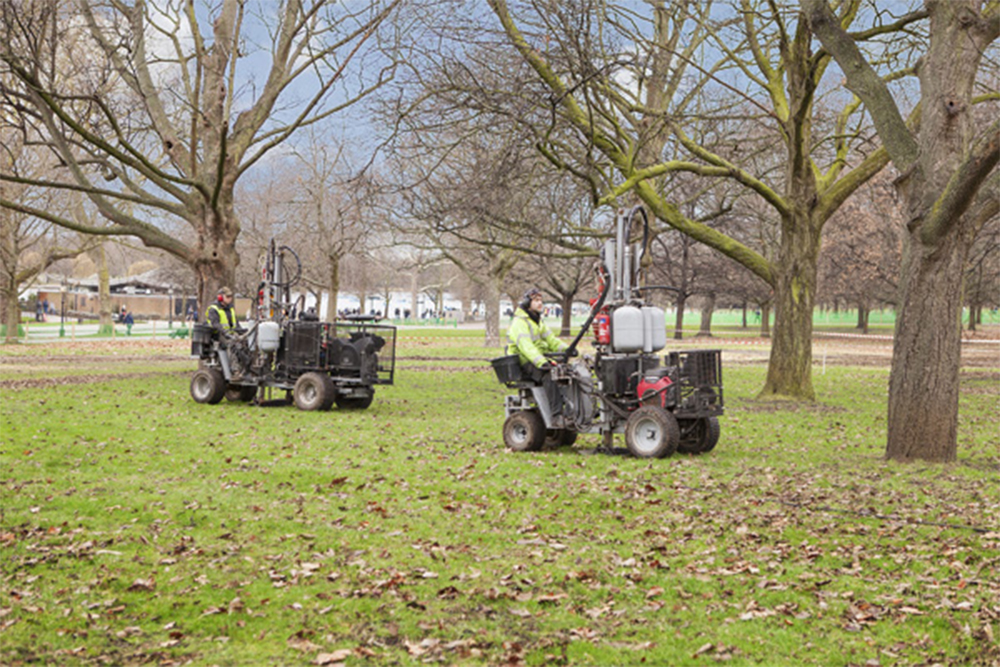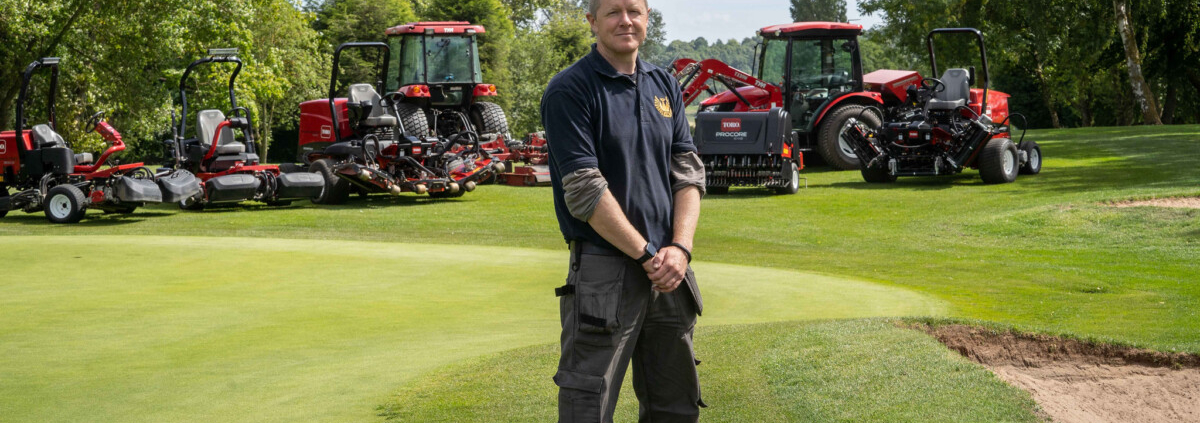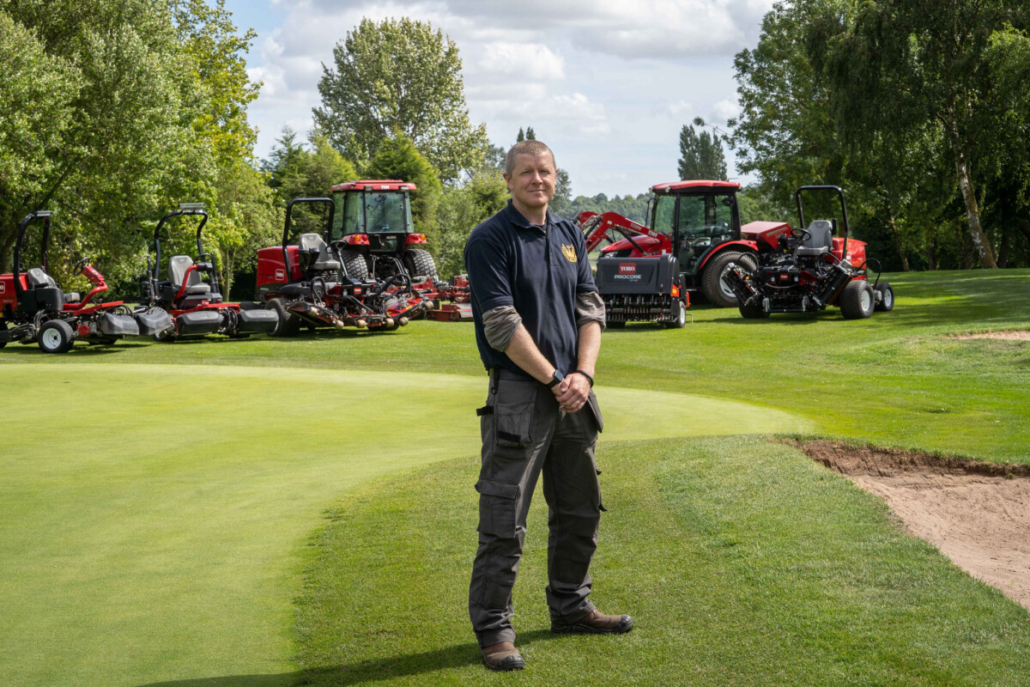Cost-effective solutions from Terrain Aeration
Cost-effective solutions from Terrain Aeration: We take for granted trees, sports pitches and green spaces in our parks and urban environments, as a natural part of the landscape. Yet, all too often, trees are subjected to stress because of several factors.
Nutrient shortages, surface compaction, and waterlogging, where water drains off hard surface pathways, all have their effect. Sports pitches and open spaces suffer from constant play and foot traffic. Frequently sited on made-up ground, they too experience major problems with drainage. Reductions in Local Authority budgets in recent years are bound to influence the care of trees, parks, pitches and open spaces. While essential to urban communities on many levels, they are costly to the councils who must seek ways of reducing costs. Deep aeration specialists Terrain Aeration has several cost-effective solutions developed over thirty years of treating trees, sports grounds and green spaces.

Cost-effective solutions from Terrain Aeration
Councils have not had to spend so much money this year on watering trees, but if the trees were aerated and had a water-storing polymer injected, this would be a one-off treatment (unless, for example, the area is regularly used for concerts held each year). These trees would be able to access a higher percentage of oxygen and water, resulting in a stronger root growth and canopy spread. Natural flora and fauna could take over with enormous cost savings to councils. The roots would be less susceptible to rot and anaerobic conditions, resulting in healthier trees. This helps them to live longer and reduce costs by not having to fell, chip and take away the tree, and without the cost of a replacement.
Trees which have had materials stored over the root zone or where too many vehicles have passed over the roots during building works can be helped. Tree Preservation Officers fully endorse the use of the Terralift machine to aerate, decompact and inject oxygen back into the soil structure.
With councils cutting back on spending money on sports facilities, one way of saving money is to carry out deep aeration on sports pitches, instead of putting in new drains. Even with new drains, you would still have compaction panning in between the drain runs, but with the Terralift machine, the complete area is decompacted from one metre to the surface with each shot interlinking with the previous ones. This deep aeration treatment lasts for around 7-12 years, even longer if the ground is spiked as part of the normal aeration process; which would link to the fissures created by the Terralift machine.
Unlike normal aeration, Terrain Aeration’s Terralift machine is designed to penetrate as deep as one metre using a probe, which releases compressed air at a maximum of 20Bar (280psi). This fractures the soil, resulting in fissures that interlink as the Terralift repeats the process on a grid system of two-metre spacings. The network of fissures allows maximum penetration of air and water. On the tail end of the blast, the probe injects dried seaweed that expands and contracts with the moisture content in the ground to allow drainage and air to the roots. The treatment is long term with the cost amortised over the many trouble-free years ahead. Our service has been used by the Royal Parks in London, ranging from Hyde Park, Kensington Gardens, Regent’s Park and Greenwich Park to Local Authorities throughout the UK. Working closely with Tree Preservation Officers and Park Managers our treatment goes far beyond the effects of normal aeration to represent long-term savings.
In typical case studies, in Hyde Park we treated areas around the trees and prepared the ground for the huge numbers of visitors attending the various events in the parks. The primary areas to be treated were north of the Bandstand, an area of 10,200 m2 with sycamores and elms, and the ash tree circle north of Serpentine Road. Terrain Aeration has also treated the area around the Horse Chestnut group in Kensington Gardens to the east of Broadwalk and in Regent’s Park, the area beneath the canopies of the first and second line of trees between Chester Road and Ready Money Fountain. An area of two thousand five hundred square metres beneath canopies of Norway maples at the southern end of Marylebone Green has also had the Terralift treatment. In Greenwich Park, we applied our technology across 15,000 m2.
Darlington Council called upon us to treat the trees suffering from compaction in their South Park. With the South Park trees, all the lawn was aerated as well with mycorrhizal fungi. These attach themselves to the tips of the roots and help them break through hard soil, leaving the tree more energy to grow leaves and in size. The soil was very hard and dry around the base, so some fractures were done near to the tree. We injected water-storing polymer into the area to help retain available water from rainfall for the tree roots. On most occasions, treatment is one-metre inside and one-metre outside the canopy drip line, where the growing roots lie. Decompacting around the roots and injecting air into the soil increases the percentage of uptake of oxygen into the root system.
In another case, we found there was a magnesium deficiency coupled with low overall soil fertility around trees in a park. We used our technology to measure light transmission through the leaves on the trees to gain a reading of chlorophyll levels. The likely cause of the problem was that leaf litter is always removed and had been for a century, taking with it the natural nutrients from decaying leaves. There was also severe compaction of the surface around the tree. We injected a tree feed mix containing slow-release general nutrients and magnesium, using the Terralift’s ability to inject granular material via its seaweed carrier, forcing it upwards into the root zone of the trees. This also avoids losing the nutrients to the grass, which would occur with surface treatment.
To find out how we can help with your trees, parks and sports pitches call us on 01449 673783, Email terrainaeration@gmail.com or visit www.terrainaeration.co.uk
For the latest industry news visit turfmatters.co.uk/news
Get all of the big headlines, pictures, opinions and videos on stories that matter to you.
Follow us on Twitter and Instagram for fun, fresh and engaging content.
You can also find us on Facebook for more of your must-see news, features, videos and pictures from Turf Matters.













